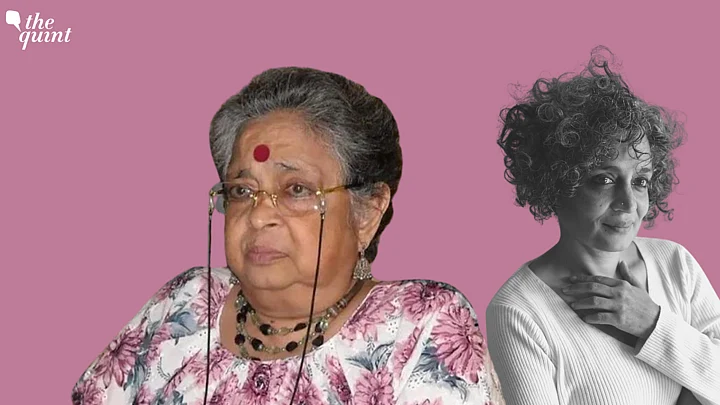“My mother broke me and made me and broke me and made me, and she still does," Man Booker Prize-winning author Arundhati Roy had observed in an interview with the BBC in 2017.
Mary Roy, an esteemed humanitarian and educationist who became famous for her legal pursuit to ensure equal rights for Syrian Christian women in their ancestral property, passed away at the age of 89 on Thursday, 1 September.
The women's rights activist is immortalised in her daughter's acclaimed novel, The God of Small Things, as 'Ammu,' a willful, rebellious, divorced mother.
However, she is best known for 'The Mary Roy Case' – her milestone legal battle that secured equal rights for women in the inheritance of ancestral property of the Syrian Christian families in Kerala.
Marriage Outside Religion, Divorce & Familial Rift
Mary Roy, born in 1933, was the youngest of four children in a Christian family residing in Kottayam. Her father, PV Isaac, was an entomologist trained in England.
After completing her graduation from the Queen's Mary College in Chennai, Roy broke what is considered a cardinal rule – to not marry outside the religion – by marrying a Bengali Hindu man, a manager with a tea estate, and left him at the age of 30 when she discovered that he was an alcoholic.
She then moved into a cottage owned by her late father with her two children. As per a study on Roy by Thomas John, she had claimed that "her mother and brother arrived in Ooty with several goondas and ordered [her] to vacate [the] cottage immediately."
She subsequently started the Pallikoodam School (formerly Corpus Christi High School) in Kottayam in 1967, of whose management she remained an active part till 2021.
After becoming financially independent, the educationist went to Delhi nearly two decades later to hire lawyers to fight her case in the court.
The 'Mary Roy Case': Battle for Women's Rights in Ancestral Property
In a landmark endeavour in the direction of gender equality for Indian women, Mary Roy in 1983 lodged a challenge in the Supreme Court, seeking rights for women in the inheritance of ancestral property of the Syrian Christian families in Kerala.
At the time, succession among Syrian Christians in Kerala was governed by the Travancore Christian Succession Act, a law passed by the erstwhile princely state of Travancore in 1917, which was adopted by the state of Kerala later.
Under the Act, a daughter was eligible only for a quarter of the son's share or Rs 5,000, whichever was less, when the father died intestate. The widow or mother was entitled only to life interest in the property devolving on them via intestate succession, which was terminable at death or remarriage.
Overturning the provisions in the Travancore Succession Act of 1916, the Supreme Court ruled in 1986 that women members of the community had equal rights in their father's property.
Roy had fought the lawsuit against her brothers, seeking equal rights in her deceased father's property. The protracted case finally came to be settled in her favour in 2009, as she was unable to get her claim executed till the time her mother, who had lifelong rights over family property, was alive.
The dispute, which deepened the rift between her and her family, came to be known as the "Mary Roy case" in the Indian legal history.
"I was just angry. I didn't have any other reason. I wasn't doing it for the public good. I was just angry because I was told to leave my father's house because I did not have a share," Roy said in an interview in 2004, when asked about her reasons for going to court.
'Harsh, Bitter & Beautiful': Arundhati Roy on Her Mother
In an interview with the BBC in 2017, writer Arundhati Roy said that she had known she would be a writer from a very young age because she understood her mother’s personal anguish when she was just three years old.
Arundhati's award-winning fictional novel, The God of Small Things, caricatures to some extent Mary Roy in the character of Ammu, a divorcee who has an affair with a man deemed as unsuitable. "Arundhati told me that some parts of the book of the book will hurt me. So, I didn't read it for a long time... I don't give a damn. I am an honest woman who had lived her life openly," the mother said of the book years later.
The author said that her mother was “raging” because of her own difficult childhood, and was also ill, both of which impacted on her own formative years.
“And I think when I was even three years old I might have been a writer then, because it was hard to be that young and to understand why an adult who was harsh with you was being harsh because her own heart was broken," Arundhati Roy was quoted as saying.
The writer described relationship with her headstrong mother as "harsh, bitter and beautiful," and said that her parent had a “lot of anger” against her: “Children shouldn’t understand those things, but writer children probably do.”
